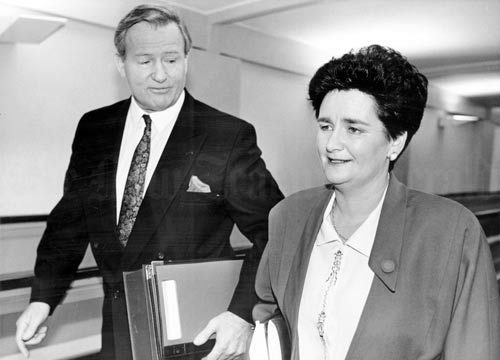
In the leadup to the 1990 General Election, the New Zealand Labour Party appeared to be falling to pieces. They had gone through three leaders in 15 months, with Mike Moore the most recent to wrest control of the jinxed idol, having convinced the hapless Labour Party caucus that he was a better bet for staving off what was looming as an electoral disaster.
The move turned a disaster into a catastrophe – the National Party won 67 seats in the election compared to Labour’s 29, as the Italy-style rapid changes in leadership gave the wider public the impression that Labour had lost the plot entirely.
This majority was enough for the National Party to force on the nation what the people called “Ruthanasia” – a Budget so callously tight-fisted that it appeared that National were trying to cull the poor through starvation.
The Budget was so unnecessarily cruel – in many cases leaving solo mothers unable to feed their own children at the end of the week – that even New Zealanders were appalled by it, and only by demoting the clearly psychopathic Ruth Richardson to the back benches did the National majority survive the 1993 General Election.
By the next election in 1996, the National Party had eroded most of the trust that Jim Bolger had earned in opposition, and they were only able to govern thanks to a rickety alliance with the New Zealand First Party.
When Jenny Shipley rolled Bolger in 1997, New Zealand had another psychopath in an influential position, and this made the alliance with Winston Peters untenable. Being neither a psychopath nor willing to submit to one, Peters was unable to work with Shipley and was duly sacked.
New Zealand First then disintegrated under the gravitational pull of the National Party as it tried to withdraw from its influence, and the New Zealand electorate responded to the wheels falling off the alliance by chucking the whole thing on the scrapyard.
The National Party was duly destroyed by Helen Clark’s Labour in 1999.
Since Helen Clark took the reins at the end of the 90s there has been nothing but orderly Government, but “History, with all her volumes vast, hath but one page…”
Our current situation in the winter of 2017 is fairly precarious, with Bill English having taken the leadership at the resignation of John Key last year. Any development that brought the stability of Bill English’s leadership into question could well lead to a comprehensive National Party loss this September.
The most likely way this would happen is by some scandal being followed by a poll that hinted suggestively at a National Party loss, at which point the National Caucus panics, then Paula Bennett does a Jenny Shipley and convinces the Caucus to support her leadership instead (ironically it was English himself who replaced Shipley as leader of the National Party in 2001).
In other words, Paula Bennett may seize upon any weakness shown by the blundering incumbent PM in order to achieve her own Prime Ministerial ambitions, despite being grossly unfit for the role.
Judith Collins might also play the role of Shipley, depending on who moves first and with what support.
Either would be suicide for the National Party, because there’s nothing less orderly than an involuntary change of leader.
What the public wants, more than anything, is that the Government maintains good order, and what the public needs, more than anything, is that the Government maintains good order.
We don’t actually need it to do much else. If it can simply keep the peace, the rest of us can get on with our lives of commerce and trade. We can make ourselves rich and happy without their help – all we need is for them to not interfere.
From 1840 to the early 1900s New Zealanders developed our country from the Stone Age to first place among all the living standards of the world, and this was achieved without any of the National, Labour, Green or New Zealand First parties existing.
All we need is for the megalomaniacs at the top of the national dominance hierarchy to maintain good order, and we can do the rest.
This is why many political commentators miss the mark when they decry Andrew Little for his lack of charisma.
It’s true that Little has the charisma of a brick, but so what? He’s not going to be personally leading a company of men into battle. He’s going to be inheriting the reins of a civil machine that has been fine-tuned for almost two decades.
His job, as mentioned above, is to maintain order. To that end, being boring is a qualification. He hasn’t said a word about either of the two hot issues stirring up the left at the moment (cannabis law reform and increasing the refugee quota), and this is no doubt a carefully calculated tactic to make him appear suitable as the man to steady the ship.
After all, it’s a heavy increase to the refugee quota that is more likely than anything else to bring a massive amount of chaos to these shores, as both the Green and Opportunity Parties are gagging for it.
Some say that the National Party are the natural ruling party of New Zealand. If there’s any truth to this it’s because the National Party are the best at maintaining good order.
If Little really wants to become Prime Minister this year, all he has to do is what Helen Clark did two decades before him – simply maintain good order in his own party, and wait for the ambition and greed of the National MPs to cause them to devour each other.
